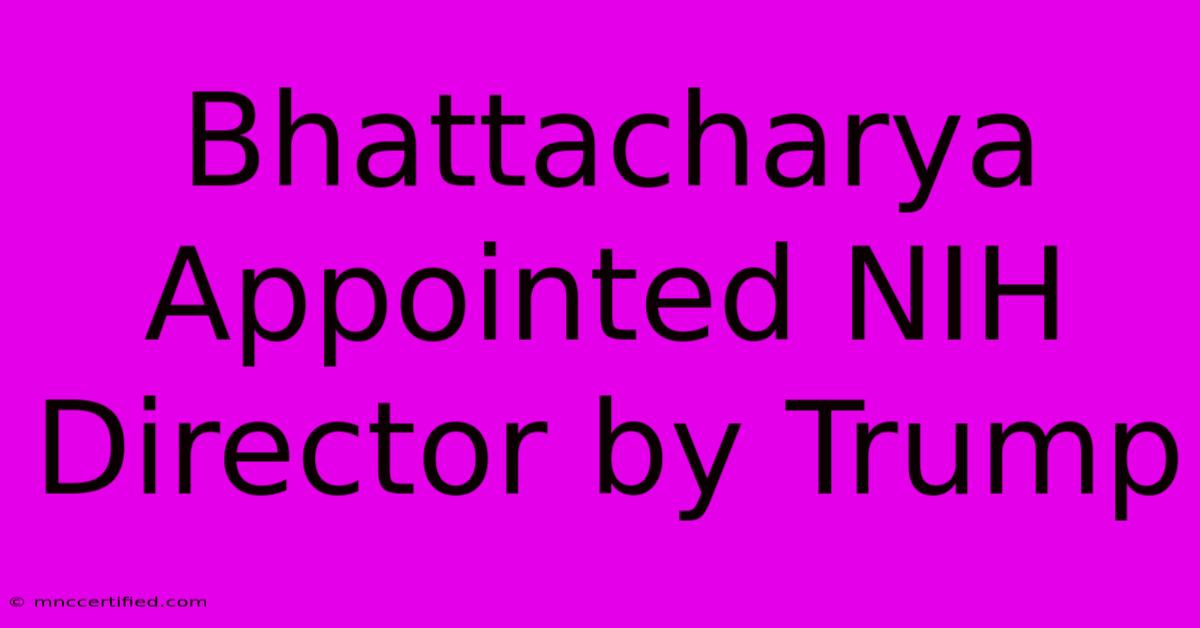Bhattacharya Appointed NIH Director By Trump

Table of Contents
Bhattacharya Appointed NIH Director: A Deep Dive into the Trump Administration's Choice
On [Insert Date], the Trump administration appointed Dr. [Bhattacharya's Full Name] as the Director of the National Institutes of Health (NIH). This appointment sparked considerable debate and controversy, raising questions about his qualifications, his views on various scientific issues, and the potential implications for the NIH's future direction. This article delves into the details of this significant event, examining the context, the reaction, and the lasting impact.
Dr. Bhattacharya's Background and Qualifications
Before his appointment, Dr. Bhattacharya held the position of [Dr. Bhattacharya's Previous Position]. His background primarily focused on [Dr. Bhattacharya's area of expertise]. While he possessed expertise in [Specific areas of expertise], his appointment to lead the NIH, a vast and multifaceted organization encompassing diverse research areas, was met with mixed reactions. Critics pointed to a perceived lack of experience in managing large-scale research programs and a potential conflict of interest stemming from his [Mention any potential conflicts of interest]. Supporters, however, highlighted his [Mention positive aspects of his qualifications and experience]. Understanding his background is crucial to assessing the implications of his appointment.
Key Criticisms and Controversies
Several aspects of Dr. Bhattacharya's appointment fueled significant criticism. These included:
-
His Stance on [Specific Controversial Issues]: Dr. Bhattacharya's publicly stated views on [Specific scientific issues, e.g., climate change, vaccine mandates] were at odds with the prevailing scientific consensus. This raised concerns among scientists and researchers about the potential for politically motivated interference in the NIH's research agenda.
-
Lack of Experience in NIH-Specific Administration: The sheer scale and complexity of the NIH required extensive experience in managing a large federal agency. Critics argued that Dr. Bhattacharya's background lacked the necessary administrative expertise to effectively lead the NIH.
-
Potential for Political Influence: The timing and context of the appointment fueled speculation about political motivations. The perception of political influence over scientific decisions raised concerns about the integrity and objectivity of NIH research.
The Impact on NIH Research and Funding
Dr. Bhattacharya's appointment potentially had significant ramifications for NIH research and funding priorities. His views on [Specific research areas] could have led to shifts in funding allocations, potentially favoring research aligned with his perspectives while neglecting other vital areas. This possibility prompted concerns among researchers whose work might be affected. The uncertainty surrounding his leadership also impacted researchers seeking grants and funding, creating a climate of apprehension.
Long-Term Consequences
The long-term consequences of Dr. Bhattacharya's appointment are still being assessed. The potential impact on the NIH's reputation, its research agenda, and its ability to attract top talent remain key areas of ongoing discussion and analysis. The appointment highlighted the importance of ensuring that the leadership of scientific agencies remains firmly grounded in scientific expertise and free from undue political influence.
Conclusion: A Case Study in Scientific Leadership and Political Influence
The appointment of Dr. Bhattacharya as NIH Director served as a significant case study in the intersection of science and politics. It underscored the ongoing debate about the appropriate balance between scientific expertise and political considerations in the leadership of vital scientific institutions. The controversies surrounding his appointment highlight the critical need for transparency and accountability in the selection process for such crucial roles. The episode continues to spark discussion about the importance of maintaining the integrity and independence of scientific research in the face of political pressures.
Keywords: Bhattacharya, NIH Director, Trump Administration, NIH, National Institutes of Health, Scientific Appointments, Political Influence, Research Funding, Scientific Controversy, [Add other relevant keywords related to Bhattacharya's specific areas of expertise and controversies].
Note: This article provides a template. You should replace the bracketed information with specific details about Dr. Bhattacharya's appointment, ensuring factual accuracy. Thorough research is crucial to create a comprehensive and informative piece. Remember to cite your sources appropriately.

Thank you for visiting our website wich cover about Bhattacharya Appointed NIH Director By Trump. We hope the information provided has been useful to you. Feel free to contact us if you have any questions or need further assistance. See you next time and dont miss to bookmark.
Featured Posts
-
Campervan Insurance In Ireland
Nov 27, 2024
-
Major Supermarket Hit By Stock Shortages
Nov 27, 2024
-
Cheap Auto Insurance Kalamazoo
Nov 27, 2024
-
Unc Football Coaching Search 10 Potential Coaches
Nov 27, 2024
-
Morgan Freemans Rare Dinner Outing
Nov 27, 2024